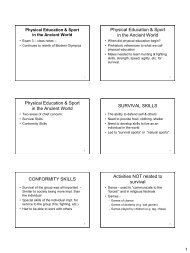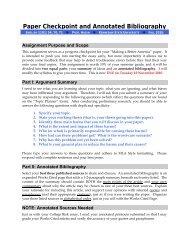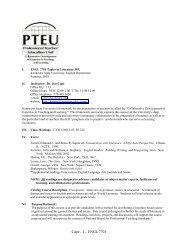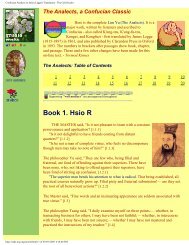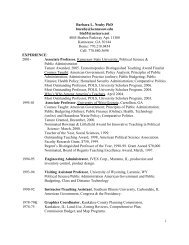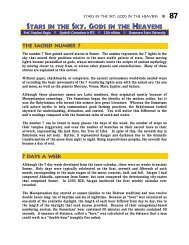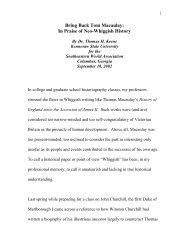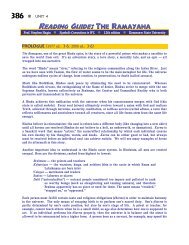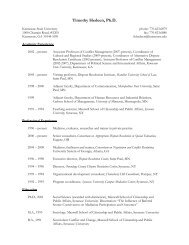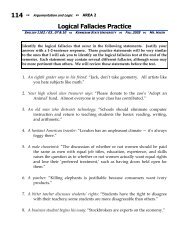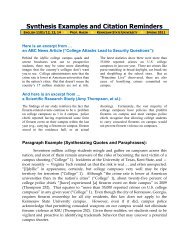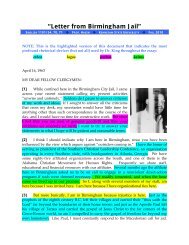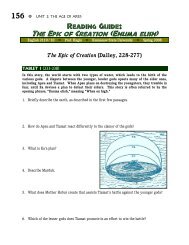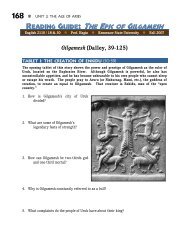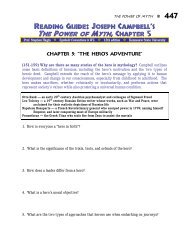Reading Guide: The Epic of Gilgamesh - KsuWeb - Kennesaw State ...
Reading Guide: The Epic of Gilgamesh - KsuWeb - Kennesaw State ...
Reading Guide: The Epic of Gilgamesh - KsuWeb - Kennesaw State ...
You also want an ePaper? Increase the reach of your titles
YUMPU automatically turns print PDFs into web optimized ePapers that Google loves.
140 K UNIT 2<br />
ironically placing us close to the hands <strong>of</strong> death. Those <strong>of</strong> us who like driving too fast, jumping out<br />
<strong>of</strong> airplanes, or riding roller coasters are acting a lot like <strong>Gilgamesh</strong> did.<br />
Enkidu is adopted by Ninsun, <strong>Gilgamesh</strong>’s mother, who asks Enkidu to look out for her son. Now that<br />
these characters are “brothers,” they should help each other to stay out <strong>of</strong> trouble. Enkidu,<br />
however, instructs the elders to dissuade <strong>Gilgamesh</strong> from taking this trip on page 63, calling it a<br />
journey “not to be undertaken.” <strong>Gilgamesh</strong>, however, asks his mom, Ninsun, for advice, and she<br />
laments to Shamash (the sun god) that her son has a restless heart.<br />
Ninsun, Shamash, and the city elders instruct Enkidu to be the leader on the journey, to guide<br />
<strong>Gilgamesh</strong> into the forest, and to bring him back alive. After all, Enkidu knows the paths and the<br />
dangers <strong>of</strong> the forest, so he should lead <strong>Gilgamesh</strong>.<br />
NOTE: When you reach the bottom <strong>of</strong> page 66, flip to pages 146-147 to read an additional scene<br />
showing the elders <strong>of</strong> Uruk blessing the travelers before they depart and instructing them on how to<br />
win the “impossible challenge.”<br />
Questions for <strong>The</strong> <strong>Epic</strong> <strong>of</strong> <strong>Gilgamesh</strong> (Tablet III)<br />
24. Why do the elders in Uruk instruct Enkidu to lead the way into the Pine Forest?<br />
25. Why does <strong>Gilgamesh</strong> run his idea for adventure past his mother, Ninsun?<br />
26. What character trait in <strong>Gilgamesh</strong> does Ninsun lament about to Shamash?<br />
27. What is Shamash’s decision? How does he justify it?<br />
Tablet IV: <strong>The</strong> Journey to Lebanon (67-71)<br />
Tablet IV begins with a description <strong>of</strong> the travelers riding upstream to Lebanon. <strong>The</strong> trip takes from<br />
“the new moon to the full moon,” implying a 14-15-day journey, plus 3 additional days (for a total <strong>of</strong> 17-<br />
18 travel days). <strong>The</strong> changes in the moon are symbolic. <strong>The</strong> full moon would have signified the height<br />
<strong>of</strong> danger and evil, since the moon represents the dark side <strong>of</strong> life. A new moon (invisible to the eye)<br />
would have indicated the most auspicious interpretations. <strong>The</strong>refore, as the two warriors travel<br />
upstream, the moon grows bigger and bigger, representing that bad days are approaching quickly.<br />
<strong>Gilgamesh</strong> has several dreams in this story, but three important dreams occur on these three extra<br />
days following the full moon, each translated by Enkidu. <strong>The</strong> first dream shows a mountain toppling<br />
onto the plains at <strong>Gilgamesh</strong>’s feet, and Enkidu says that this represents the fall <strong>of</strong> Humbaba and<br />
victory in battle.<br />
<strong>The</strong> second dream is not attainable from the broken text, but other translations discuss <strong>Gilgamesh</strong><br />
battling with a bull. Enkidu interprets this to mean that Shamash, the sun god (symbolized as a bull),<br />
will protect <strong>Gilgamesh</strong> on the trip. It also may represent the slaying <strong>of</strong> Humbaba as well, and it<br />
likely foreshadows their battle with the Great Bull <strong>of</strong> Heaven after they return from Lebanon.<br />
<strong>Gilgamesh</strong>’s third dream, however, is a nightmare, and <strong>Gilgamesh</strong> is afraid <strong>of</strong> it. He dreams <strong>of</strong> death<br />
and destruction, and his world burning down to ashes. This interpretation makes Enkidu become<br />
“paralyzed” with fear.



